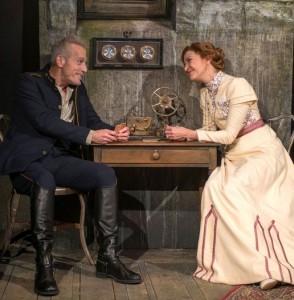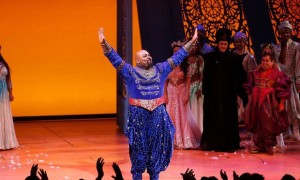 Buddy Holly and the Crickets appear on a 1957 episode of Arthur Murray Dance Party:
Buddy Holly and the Crickets appear on a 1957 episode of Arthur Murray Dance Party:
(This is the latest in a series of arts-related videos that appear in this space each Monday and Wednesday.)
Terry Teachout on the arts in New York City
 “Humility is not a virtue propitious to the artist. It is often pride, emulation, avarice, malice—all the odious qualities—which drive a man to complete, elaborate, refine, destroy, renew, his work until he has made something that gratifies his pride and envy and greed. And in doing so he enriches the world more than the generous and good, though he may lose his own soul in the process. That is the paradox of artistic achievement.”
“Humility is not a virtue propitious to the artist. It is often pride, emulation, avarice, malice—all the odious qualities—which drive a man to complete, elaborate, refine, destroy, renew, his work until he has made something that gratifies his pride and envy and greed. And in doing so he enriches the world more than the generous and good, though he may lose his own soul in the process. That is the paradox of artistic achievement.”
Evelyn Waugh, review of Garry Wills’ Chesterton: Man and Mask (courtesy of Patrick Kurp)
The Wall Street Journal isn’t publishing a print version today, but my Friday drama column appears as usual online. Today I report on the Hudson Valley Shakespeare Festival’s production of Othello. Here’s an excerpt.
* * *
“Othello” is about many things, but one of them is (very obviously) race. You’d think, then, that Shakespeare’s harrowing tale of the jealous Moor and his innocent white wife would bring out the worst in postmodern stage directors, many of whom are reflexively predisposed to hammer any such hot button deep into the ground. And you’d be wrong, at least in my experience: None of the five “Othellos” that I’ve reviewed in this space since 2005 was explicitly political in its approach. Neither is Christopher V. Edwards’ new Hudson Valley Shakespeare Festival production, a hard-nosed, hard-hitting modern-dress version that goes straight to the point—jealousy—and stays there….
 The acting is naturalistic, the violence blunt and believable, and it isn’t hard to conjure up convincing backstories for the main characters. Mr. Lowe’s Othello could easily be a physically slight ghetto kid who joined the Army to escape the street and made himself over into a straight-arrow soldier. As for Mr. Rhoads’ regular-guy Iago, he’s an equally familiar type, a gray-at-the-temples wheelhorse who got passed over for promotion and now finds himself taking orders from a hotshot with a pretty young wife (Susannah Millonzi). He’s not oily, not sinister, not oozing with snarly malevolence: All he wants is what he thinks he’s got coming to him, and he’ll do whatever he has to do to get it. Such everyday conflicts are the stuff of which everyday murders are made.
The acting is naturalistic, the violence blunt and believable, and it isn’t hard to conjure up convincing backstories for the main characters. Mr. Lowe’s Othello could easily be a physically slight ghetto kid who joined the Army to escape the street and made himself over into a straight-arrow soldier. As for Mr. Rhoads’ regular-guy Iago, he’s an equally familiar type, a gray-at-the-temples wheelhorse who got passed over for promotion and now finds himself taking orders from a hotshot with a pretty young wife (Susannah Millonzi). He’s not oily, not sinister, not oozing with snarly malevolence: All he wants is what he thinks he’s got coming to him, and he’ll do whatever he has to do to get it. Such everyday conflicts are the stuff of which everyday murders are made.
Mr. Rhoads dominates the scenes that he shares with Mr. Lowe, and that’s as it should be. This is, after all, a staging in which Othello really is the “credulous fool” that Iago takes him to be, a basically good guy who never knew what hit him until it was too late. But it’s Ms. Millonzi who brings home the prize. She appeared three summers ago in a Shakespeare & Company production of “Romeo and Juliet” in which she played Juliet as a sullen woman-child ablaze with the fires of love. She hews to a similar line here, turning Desdemona into a fully sexual being who is hopelessly smitten with her handsome husband—which makes his dizzying descent into madness all the more horrifying…
* * *
Read the whole thing here.
 “Or it is possible that fellows like Willie Stark are born outside of luck, good or bad, and luck, which is what about makes you and me what we are, doesn’t have anything to do with them, for they are what they are from the time they first kick in the womb until the end. And if that is the case, then their life history is a process of discovering what they really are, and not, as for you and me, sons of luck, a process of becoming what luck makes us.”
“Or it is possible that fellows like Willie Stark are born outside of luck, good or bad, and luck, which is what about makes you and me what we are, doesn’t have anything to do with them, for they are what they are from the time they first kick in the womb until the end. And if that is the case, then their life history is a process of discovering what they really are, and not, as for you and me, sons of luck, a process of becoming what luck makes us.”
Robert Penn Warren, All the King’s Men
Here’s my list of recommended Broadway, off-Broadway, and out-of-town shows, updated weekly. In all cases, I gave these shows favorable reviews (if sometimes qualifiedly so) in The Wall Street Journal when they opened. For more information, click on the title.
BROADWAY:
• Bullets Over Broadway (musical, PG-13, reviewed here)
• Cabaret (musical, PG-13/R, nearly all performances sold out last week, closes Jan. 4, reviewed here)
• A Gentleman’s Guide to Love & Murder (musical, PG-13, all performances sold out last week, reviewed here)
• Matilda (musical, G, all performances sold out last week, reviewed here)
• Les Misérables (musical, G, too long and complicated for young children, most performances sold out last week, reviewed here)
• Of Mice and Men (drama, PG-13, nearly all performances sold out last week, closes July 27, reviewed here)
• Once (musical, G/PG-13, reviewed here)
• Rocky (musical, G/PG-13, reviewed here)
OFF BROADWAY:
• The Fantasticks (musical, G, suitable for children capable of enjoying a love story, reviewed here)
• When We Were Young and Unafraid (drama, PG-13, closes Aug. 10, reviewed here)
IN CHICAGO:
• Juno (musical, PG-13, closes July 27, reviewed here)
 IN GLENCOE, ILL.:
IN GLENCOE, ILL.:
• The Dance of Death (drama, PG-13, closes Aug. 3, reviewed here)
• Days Like Today (musical, PG-13, closes July 27, reviewed here)
CLOSING SOON ON BROADWAY:
• The Cripple of Inishmaan (serious comedy, PG-13, closes July 20, reviewed here)
CLOSING NEXT WEEK IN PITTSFIELD, MASS.:
• Kiss Me, Kate (musical, G/PG-13, closes July 12, reviewed here)
 “I know some law. In fact, I know a lot of law. And I made me some money out of law. But I’m not a lawyer. That’s why I can see what the law is like. It’s like a single-bed blanket on a double bed and three folks in the bed and a cold night. There ain’t ever enough blanket to cover the case, no matter how much pulling and hauling, and somebody is always going to nigh catch pneumonia.”
“I know some law. In fact, I know a lot of law. And I made me some money out of law. But I’m not a lawyer. That’s why I can see what the law is like. It’s like a single-bed blanket on a double bed and three folks in the bed and a cold night. There ain’t ever enough blanket to cover the case, no matter how much pulling and hauling, and somebody is always going to nigh catch pneumonia.”
Robert Penn Warren, All the King’s Men
 My essay in the July issue of Commentary is about what I have dubbed the “commodity musical,” a phenomenon of which I take a very dark view:
My essay in the July issue of Commentary is about what I have dubbed the “commodity musical,” a phenomenon of which I take a very dark view:
Ten new musicals opened on Broadway in the 2013–14 season. Four of them—Aladdin, Big Fish, Bullets Over Broadway, and Rocky—were directly adapted from familiar American movies and shared their titles. Two others, A Gentleman’s Guide to Love & Murder and The Bridges of Madison County, were based on novels that had already inspired a pair of well-known films. And two of the four medium-sized musicals that opened off Broadway, Far from Heaven and Little Miss Sunshine, were also based on movies of the same name.
This was no anomaly. Of the 12 shows to be nominated for best-musical Tony Awards in 2011, 2012, and 2013, six were adapted from movies whose titles they shared. With few exceptions, they closely resembled the films after which they were named, most of which were either box-office hits or less popular films such as A Christmas Story and Newsies that had acquired followings after they were shown on TV or released on home video.
The most distinctive feature of these musicals is that they usually treat their source material not as a springboard for fresh, creative endeavor but as an exploitable economic commodity that can be “repurposed” for further profit. A few years ago, I started using the phrase “commodity musical” to describe them. The genre has established itself as the most significant development in the Broadway musical form since Stephen Sondheim started writing his own scores. What is it that makes these shows so popular—and what effect is their popularity having on the American musical?…
Read the whole thing here.
An ArtsJournal Blog